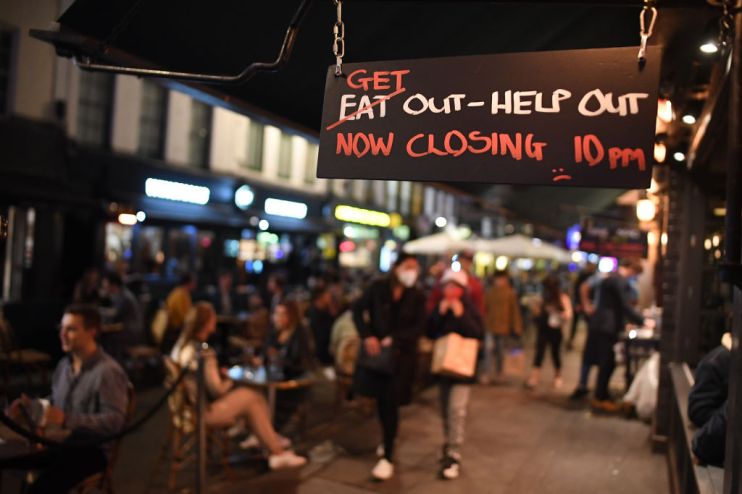A VAT break on booze would allow entrepreneurs to rebuild British high streets

Hospitality employs 9 per cent of the UK’s workforce.
Or perhaps ‘did employ’ is a more accurate phrase.
Undoubtedly, there will be more redundancies within this sector – at a phenomenal cost, ultimately, to the taxpayer.
We all know that hospitality has been one of the worst hit sectors in the economy as a result of shutdowns, lockdowns, and baffling regulations.
There have already been estimates of 650,000 UK hospitality sector redundancies in 2020, representing one third of all UK redundancies.
Read more: The fight for the future of British fish and seafood
Few people realise that the UK has provided significantly less support than either the EEC or USA for businesses severely affected by the pandemic.
Take one example – the D&D Restaurant Group CEO, Des Gunewardener, went public recently with a statement that the vast majority of D&D’s pandemic related costs in New York and Paris had been covered by respective government support. In the UK, D&D are shut with £1.5m a month of unsupported losses. The furlough scheme can only do so much.
As well as uncertainty about when we can open, we keep hearing warnings of new regulations even as we’re able to welcome punters back.
Take the floated plan to ban alcohol sales.
A major proportion of UK hospitality revenue is alcoholic beverages – in our restaurants, close to 50 per cent of revenue.
With net profit averaging below 5 per cent in most restaurants even before Covid-19, the idea of banning alcohol sales in restaurants and bars is ludicrous and reflects no understanding of our business. Labour requirements would remain the same and as a proportion of sales would almost double to 50-70%. We would be better off closed. I assume this ill thought out idea will be dropped.
VAT cut would be the lifeline we need
But ponder the thought of the government potentially losing a slice of VAT revenue from hospitality for a short period of time.
Our industry is counting on the lifeline VAT reduction from 20 per cent to 5 per cent on food being extended beyond March.
As we have not had the opportunity to participate in this offer of extended support during the forced closure this should be a given, along with further business rates holidays.
But additional measures are required if we are to avoid the mass unemployment that will kick in after furlough ends and if we wish to allow hospitality to rebuild its finances.
The most efficient method to inject funds into hospitality, to where it will count most, is to also reduce VAT on alcohol from 20 per cent to 5 per cent as well.
Read more: The City View with pubs boss Emma McClarkin
This will not result in discounting, but will instead provide financial support by increasing margins commensurate to turnover allowing trading business to employ more staff and invest in the future whilst replenishing their balance sheets.
The first few months will be very difficult. This would allow hospitality to invest in sufficient staff to provide service in what is a remarkably unpredictable business, and will be particularly more so in the period post lockdown with most people continuing to work from home and an effective ban on tourism.
The UK Government furlough scheme has supported staff, but has not compensated business for the costs of enforced closure as has happened in Europe and America.
It’s a significantly easier way to support us than fiddling around with Coronavirus Business Interruption Loans or any further strings-attached grants.
The bureaucracy of getting a CBIL facility, the number of firms that were unable to access one – into the six figures – and the interest rates rather more favourable to banks than firms’ bank accounts will certainly not be missed.
The VAT cut, however, requires no administration, no long bureaucratic process, no middle men, is proportionate to trading and does not exclude the less fortunate.
This would be a vitally needed financial stimulus delivered to the heart of the our fourth largest national employer which contributes £160bn to the UK economy.
And at least we can serve food – even harder hit are the bars and clubs where alcohol is the vast majority of sales. And more so wet-led hospitality (64 per cent of UK pubs are wet led), in poorer less affluent areas that provide a social lifeline for communities to socialise, who do not have the disposable income to eat out.
These businesses are unable to diversify into a food led operation as there is not sufficient demand or they do not have the facilities to do so. Hence massive closures in this sector, local unemployment and a loss of premises for communities (an older demographic with less affinity to the potential refuge of social media) to gather. I can only imagine that puritanical zeal is the reason for these businesses being ruled as being unworthy of support.
It is time for the government to take stock of the facts and act.